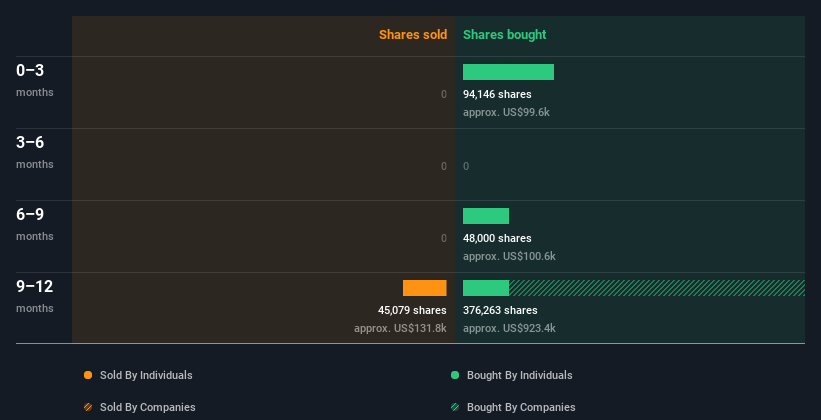A number of insiders bought Qumu Corporation (NASDAQ:QUMU) stock last year, which is great news for shareholders
Usually, when one insider buys stock, it might not be a monumental event. But when multiple insiders are buying like they did in the case of Qumu Corporation (NASDAQ:QUMU), that sends out a positive message to the company's shareholders.
While we would never suggest that investors should base their decisions solely on what the directors of a company have been doing, we do think it is perfectly logical to keep tabs on what insiders are doing.
View our latest analysis for Qumu
Qumu Insider Transactions Over The Last Year
The insider, David Ristow, made the biggest insider sale in the last 12 months. That single transaction was for US$132k worth of shares at a price of US$2.92 each. While insider selling is a negative, to us, it is more negative if the shares are sold at a lower price. The silver lining is that this sell-down took place above the latest price (US$0.79). So it may not tell us anything about how insiders feel about the current share price. David Ristow was the only individual insider to sell shares in the last twelve months.
Over the last year, we can see that insiders have bought 190.15k shares worth US$319k. On the other hand they divested 45.08k shares, for US$132k. Overall, Qumu insiders were net buyers during the last year. Their average price was about US$1.68. I'd consider this a positive as it suggests insiders see value at around the current price. The chart below shows insider transactions (by companies and individuals) over the last year. By clicking on the graph below, you can see the precise details of each insider transaction!
Qumu is not the only stock insiders are buying. So take a peek at this free list of growing companies with insider buying.
Qumu Insiders Bought Stock Recently
It's good to see that Qumu insiders have made notable investments in the company's shares. Not only was there no selling that we can see, but they collectively bought US$100k worth of shares. This is a positive in our book as it implies some confidence.
Does Qumu Boast High Insider Ownership?
I like to look at how many shares insiders own in a company, to help inform my view of how aligned they are with insiders. A high insider ownership often makes company leadership more mindful of shareholder interests. Our data suggests Qumu insiders own 3.7% of the company, worth about US$522k. We consider this fairly low insider ownership.
So What Do The Qumu Insider Transactions Indicate?
It's certainly positive to see the recent insider purchases. We also take confidence from the longer term picture of insider transactions. But on the other hand, the company made a loss during the last year, which makes us a little cautious. On this analysis the only slight negative we see is the fairly low (overall) insider ownership; their transactions suggest that they are quite positive on Qumu stock. In addition to knowing about insider transactions going on, it's beneficial to identify the risks facing Qumu. Our analysis shows 3 warning signs for Qumu (1 is potentially serious!) and we strongly recommend you look at them before investing.
If you would prefer to check out another company -- one with potentially superior financials -- then do not miss this free list of interesting companies, that have HIGH return on equity and low debt.
For the purposes of this article, insiders are those individuals who report their transactions to the relevant regulatory body. We currently account for open market transactions and private dispositions, but not derivative transactions.
Have feedback on this article? Concerned about the content? Get in touch with us directly. Alternatively, email editorial-team (at) simplywallst.com.
This article by Simply Wall St is general in nature. We provide commentary based on historical data and analyst forecasts only using an unbiased methodology and our articles are not intended to be financial advice. It does not constitute a recommendation to buy or sell any stock, and does not take account of your objectives, or your financial situation. We aim to bring you long-term focused analysis driven by fundamental data. Note that our analysis may not factor in the latest price-sensitive company announcements or qualitative material. Simply Wall St has no position in any stocks mentioned.
Join A Paid User Research Session
You’ll receive a US$30 Amazon Gift card for 1 hour of your time while helping us build better investing tools for the individual investors like yourself. Sign up here

 Yahoo Finance
Yahoo Finance 
